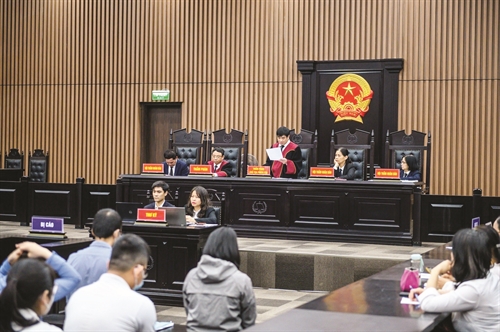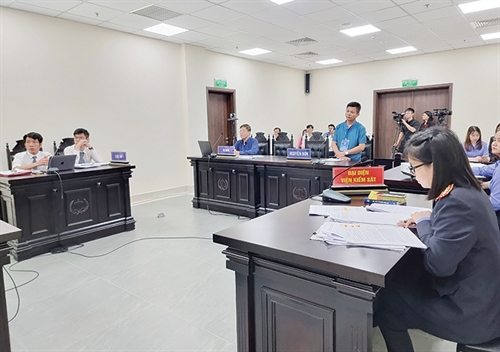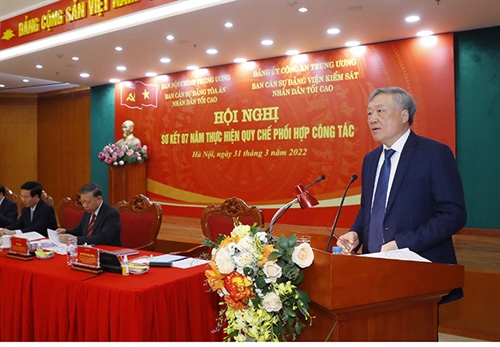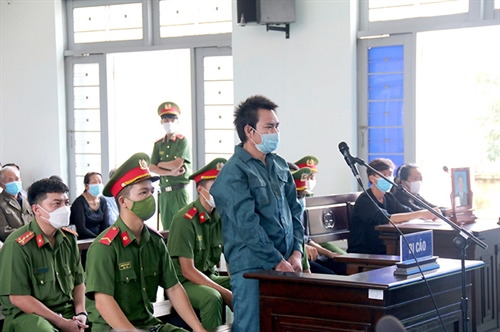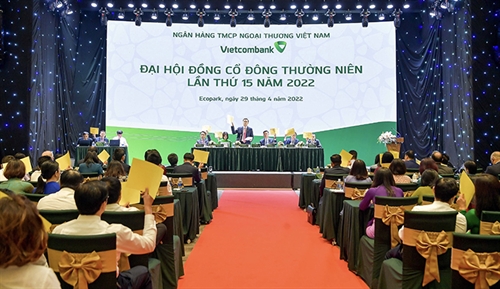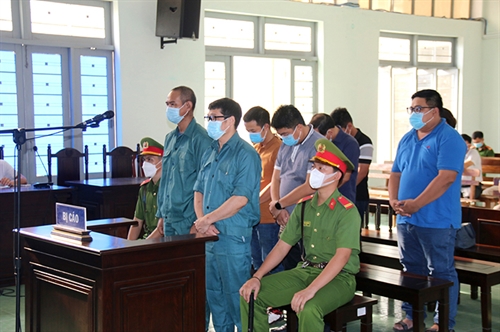Le Manh Hung
Deputy Director of the International Cooperation Department
The Supreme People’s Court
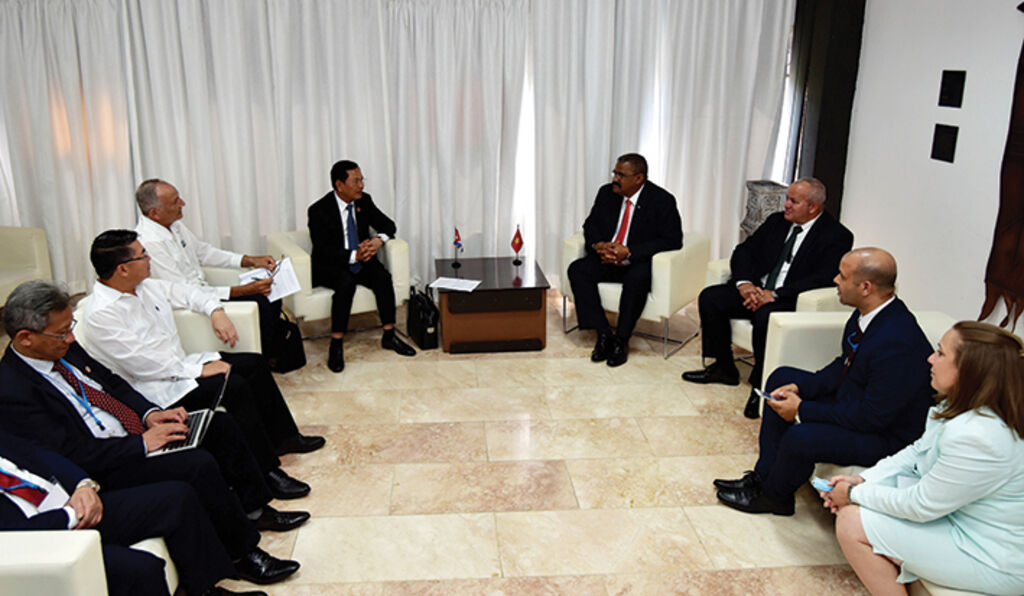 |
| A working session between officials from the Vietnamese and Cuban Surpreme People’s Courts__Photo: VNA |
Under current laws, Vietnamese courts settle requests for recognition and enforcement of civil judgments and rulings of foreign courts based on such important legal grounds as Vietnam’s international commitments as well as its unilateral commitments on the principle of reciprocity.
The recent reality shows that courts, litigants, lawyers, and related individuals and organizations all hold divergent viewpoints and opinions on how to interpret and apply the principle of reciprocity, thus making it difficult to settle aforesaid requests. Among these viewpoints, the most common holds that requests for recognition and enforcement of civil judgments and rulings of foreign courts constitute a type of requests for mutual legal assistance in civil matters, and that the application of the principle of reciprocity to settle such requests must comply with the law on mutual legal assistance in civil matters. It is also held by many legal experts that Vietnamese courts may only apply this principle to accept and settle recognition and enforcement requests on the condition that such foreign courts have once recognized and permitted the enforcement of civil judgments and rulings of Vietnamese courts.
Requests for recognition and enforcement of civil judgments and rulings of foreign courts
As per the international law’s principle of sovereign equality, judgments and rulings in general and civil ones in particular of a country’s courts are effective for enforcement only in such country’s territory and have, by default, no effect for enforcement in other countries’ territories.
However, the limitation of the territory-based enforcement effect of court judgments and rulings fails to meet the aspiration of parties to international civil relations. Accordingly, upon the establishment, performance or termination of international civil relations, parties to such relations should acquire firm security in terms of legal bases to ensure that any disputes between them that have been settled by a country’s court can no longer be adjudicated in other countries and will not be subject to contradictory judgments or rulings. Besides, it is obvious that all countries where civil matters occur do not want to waste their resources for settling again and again disputes between parties to international civil relations. They also wish to share common benefits from the promotion of healthy development of international civil relations.
Therefore, a country’s courts recognizing and enforcing civil judgments and rulings of another country’s courts constitutes an appropriate solution for countries to settle conflicts and disputes arising from the principle of sovereign equality and at the same time to secure benefits of every single country in international civil relations.
Since Vietnam always upholds the principle of sovereign equality, civil judgments and rulings of foreign courts are not automatically effective for enforcement in Vietnam under its civil judgment enforcement law like those of domestic courts. Therefore, in order to have civil judgments and rulings of foreign courts enforced in Vietnam, litigants have to make requests for recognition and permission by Vietnamese courts for enforcement of such judgments and rulings in the Vietnamese territory.
In essence, requests for recognition and enforcement of civil judgments and rulings of foreign courts are those for permission for such judgments and rulings, once effective, to take legal effect like legally effective judgments and rulings of Vietnamese courts so that they can be enforced in accordance with Vietnam’s civil judgment enforcement law.
Vietnamese courts have the power to recognize and enforce civil judgments and rulings of foreign courts in Vietnam or refuse to do so.
Legal grounds for recognizing and enforcing civil judgments and rulings of foreign courts
Vietnamese courts may consider settling requests for recognition and enforcement of civil judgments and rulings of foreign courts on either of the following legal grounds:
· Bilateral commitments between Vietnam and foreign countries on this matter. Accordingly, Vietnam and a foreign country make a commitment under a bilateral agreement that courts of one country will consider recognizing and enforcing civil judgments and rulings of courts of the other country upon the latter’s request. Such commitment is binding and must be realized by Vietnam and the foreign country on the basis of litigants’ written requests.
· Vietnam’s unilateral commitments on the application of the principle of reciprocity. Accordingly, Vietnam’s civil procedure law states that Vietnamese courts apply the principle of reciprocity to consider and settle requests for recognition and enforcement of civil judgments and rulings of courts of foreign countries that have never been contracting parties to international treaties to which Vietnam is also a contracting party or bilateral treaties/agreements with Vietnam on this matter. However, it should be noted that such unilateral commitments are not Vietnam’s obligation but only express the country’s respectful attitude and cooperative goodwill toward foreign countries. By those commitments, Vietnam aspires that it and foreign countries grant one another equal treatment regarding the mutual recognition and enforcement of civil judgments and rulings of their courts in their territories. That’s why in case Vietnam has showed its readiness for considering and settling requests for recognition and enforcement of civil judgments and rulings of foreign courts but such foreign courts show no goodwill in return, Vietnam may refuse settling such requests.
Vietnam’s international commitments
To date, Vietnam has joined 18 bilateral agreements on mutual legal assistance with foreign countries/territories which provide mutual recognition and permission for enforcement of civil judgments and rulings[1].
Beyond the above bilateral agreements, Vietnam has not yet acceded to any multilateral treaties on this matter, including the Conventions administered by the Hague Conference on Private International Law (HCCH), such as the 2005 Convention on Choice of Court Agreements and the 2019 Convention on the Recognition and Enforcement of Foreign Judgments in Civil or Commercial Matters.
Vietnam’s unilateral commitments
Previously, under the 1993 Ordinance on Recognition and Enforcement in Vietnam of civil judgments and rulings of foreign courts, Vietnam committed only to considering the recognition and enforcement in the Vietnamese territory of civil judgments and rulings of courts of foreign countries/territories with which Vietnam had concluded bilateral treaties/agreements or together joined multilateral treaties/agreements on this matter.
However, the 2005 Civil Procedure Code (Article 343) provided for the first time that Vietnamese courts may consider recognizing and enforcing civil judgments and rulings of courts of foreign countries/territories on the principle of reciprocity no longer on the condition that Vietnam and such foreign countries/territories have concluded bilateral treaties/agreements or together joined multilateral treaties/agreements on this matter. This provision is perpetuated in the 2015 Civil Procedure Code (Article 423).
The author’s research has come up with a conclusion that Vietnam has made its unilateral commitments on application of the principle of reciprocity to settle requests for recognition and enforcement of civil judgments and rulings of foreign courts on the following grounds and for the following reasons and purposes:
Firstly, the negotiation and conclusion of treaties on mutual legal assistance in civil matters which contain provisions on recognition and enforcement of civil judgments and rulings of foreign courts have encountered many difficulties that require Vietnam to implement the policy on this matter more flexibly.
Most bilateral agreements on mutual legal assistance that contain provisions on recognition and enforcement of civil judgments and rulings of foreign courts are those concluded between Vietnam and the countries in the former socialist bloc. In addition, Vietnam has signed a few similar bilateral agreements containing provisions on mutual recognition and enforcement of civil court judgments and rulings with Algeria, Cambodia, Kazakhstan, France, Hungary, and Thailand.
In order to promote international cooperation in the field of civil justice, over recent years, Vietnam has proposed negotiation and conclusion of bilateral agreements on mutual legal assistance in civil matters, which embrace mutual recognition and enforcement of civil court judgments and rulings with numerous foreign countries. Yet, most of such countries remain hesitant to negotiate and conclude such agreements with Vietnam for the reason that they and Vietnam have already made and handled requests for mutual legal assistance in the service of documents and taking of evidences under the 1965 Hague Convention on the Service Abroad of Judicial and Extrajudicial Documents in Civil or Commercial Matters and the 1970 Hague Convention on the Taking of Evidence Abroad in Civil or Commercial Matters. They do not want to convert the mutual legal assistance provisions of these two conventions into bilateral agreements with Vietnam to only govern the mutual recognition and enforcement of civil court judgments and rulings[2].
To cope with that reality, Vietnam has adopted a flexible policy that it would, in addition to urging negotiation and conclusion of bilateral agreements with foreign countries, take the initiative in making unilateral commitments on application of the principle of reciprocity to settle foreign countries’ requests for recognition and enforcement of civil court judgments and rulings pending the accession of Vietnam and such countries to multilateral treaties with provisions on this matter.
Secondly, Vietnam’s unilateral commitments on application of the principle of reciprocity aim to contribute to realizing its open-door and international economic integration policies
Many foreign countries/territories that have fast-growing civil, trade, commercial and investment relations with Vietnam under investment promotion and protection agreements and free trade agreements[3] have not yet concluded bilateral agreements on mutual legal assistance in civil matters with Vietnam. The number of requests for recognition and enforcement of civil court judgments and rulings of such foreign countries/territories is increasing faster than that of similar requests of the aforesaid 17 foreign countries/territories that have bilateral agreements on mutual legal assistance.
So, it can be said that Vietnam’s unilateral commitments on domestic courts’ application of the principle of reciprocity in considering acceptance and settlement of requests for recognition and enforcement of civil judgments and rulings of foreign courts aim to protect and promote business, trade, commercial and investment relations between Vietnam and foreign countries/territories, contributing to successfully implementing the Vietnamese State’s open-door and international economic integration policies.
Thirdly, Vietnam’s unilateral commitments on application of the principle of reciprocity aim to facilitate the settlement of disputes and prevent the wasteful use of the State’s and litigants’ resources for the settlement of their cases at Vietnamese or foreign courts.
By recognizing and enforcing civil judgments and rulings of foreign courts, Vietnamese courts confirm that after cases have been settled, lawful rights and interests and civil liabilities of litigants under court judgments and rulings are respected and secured by law to be exercised and realized according to civil judgment enforcement procedures.
At the same time, Vietnamese courts’ rulings on recognition and enforcement of civil judgments and rulings of foreign courts will help prevent litigants from re-initiating civil lawsuits at domestic or foreign courts, thereby consolidating trust of parties to international civil, business and commercial relations in the consistency and stability of law and courts’ law observance in the settlement of requests for recognition and enforcement of civil judgments and rulings of foreign courts.
This spirit is reaffirmed in Article 472.1 of the 2015 Civil Procedure Code. Accordingly, Vietnamese courts will return lawsuit petitions or cease the settlement of civil cases that fall under the general jurisdiction of Vietnamese courts but have previously been accepted for settlement or are being settled or for which judgments or rulings have been made by foreign courts. Vietnamese courts’ refusal to exercise their jurisdiction to settle the above cases aims at (i) adhering to the principle that one civil case with the same disputing matters, claims and litigants should be settled by only one country’s court, aiming to limit the making of different judgments and rulings that might prolong the case settlement indefinitely; and (ii) ensuring that Vietnamese courts protect lawful rights and interests of litigants by settling requests for recognition and enforcement of civil judgments and rulings of foreign courts.
The Law on Mutual Legal Assistance lacks provisions on the recognition and enforcement of civil judgments and rulings of foreign courts
The Law on Mutual Legal Assistance and its guiding texts are silent about the recognition and enforcement of civil judgments and rulings of foreign courts for the reason that such requests are not for mutual legal assistance in civil matters between Vietnam and foreign countries. Specifically as follows:
Firstly, requests for mutual legal assistance in civil matters are those made by the Vietnamese State to foreign countries and vice versa for assistance in the performance of a number of civil procedure activities (service of procedural documents, taking of evidence, summoning of witnesses and expert witnesses, etc.) in order to settle civil cases or matters involving overseas litigants or with evidence to be taken overseas falling under the jurisdiction of Vietnamese or foreign courts.
Secondly, the Law on Mutual Legal Assistance, the 17 bilateral agreements on mutual legal assistance, the Convention on the Service of Documents and the Convention on the Taking of Evidence to which Vietnam is a contracting party all contain provisions requiring Vietnam and foreign countries, when making requests for mutual legal assistance, to send judicial mandate documents to the other side for performance of legal assistance. If receiving no such judicial mandate document, Vietnam may turn down foreign countries’ requests for mutual legal assistance.
Meanwhile, requests for recognition and enforcement of civil judgments and rulings of foreign courts are made by individuals and organizations that have lawful rights and interests stated in such judgments and rulings toward the States of countries where such judgments and rulings need to be enforced. Generally, the States of countries of courts that make civil judgments and rulings are not obliged to make, at their own initiative or upon request of litigants, judicial mandate documents to request foreign countries to recognize and enforce such judgments and rulings in their territories. In this spirit, the 2005 and 2015 Civil Procedure Codes both have no provision requiring dossiers of request for recognition and enforcement of civil judgments and rulings of foreign courts to contain documents on judicial mandate to such foreign countries in order to be considered legal and valid.
Thirdly, fulfilling foreign countries’ requests for mutual legal assistance in civil matters means Vietnam’s service, on such foreign countries’ behalf, of procedural documents or taking of evidences for the latter’s use as bases for the settlement of civil cases and matters at foreign courts. Similarly, based on Vietnam’s requests for mutual legal assistance in civil matters, foreign countries will carry out service of procedural documents or taking of evidences to be provided to Vietnam for use in the course of settlement of civil cases and matters at Vietnamese courts.
This mutual assistance job is not like Vietnamese courts’ own choice, in exercising Vietnam’s national jurisdiction, to weigh the possibility of permitting the “prolongation” of the enforcement effect of civil judgments and rulings of foreign courts in the Vietnamese territory.
Fourthly, although all having provisions on mutual recognition and enforcement of civil court judgments and rulings[4], the aforesaid 17 bilateral agreements on mutual legal assistance do not require Vietnam to send judicial mandate documents to the contracting foreign countries for recognizing and enforcing foreign civil courts’ judgments and rulings.
Finally, among the aforesaid 17 bilateral agreements on mutual legal assistance, 14 provide that the only assistance which Vietnam and contracting foreign countries may provide to litigants that file requests for recognition and enforcement of foreign civil court judgments and rulings is that Vietnamese and foreign central agencies will receive the requests and enclosed documents before transferring them to competent courts for handling.
From the above analyses, it can be affirmed that requests for recognition and enforcement of civil judgments and rulings of foreign courts are not for mutual legal assistance in civil matters. As a result, the provisions on application of the principle of reciprocity in mutual legal assistance of the Law on Mutual Legal Assistance and its guiding texts, particularly Joint Circular 12/2016/TTLT-BTP-BNG-TANDTC dated October 19, 2016, of the Ministry of Justice, Ministry of Foreign Affairs, and Supreme People’s Court, are not directly applicable to the consideration of acceptance and settlement of requests for recognition and enforcement of civil judgments and rulings of foreign courts.-
*The Vietnamese version of this article was published on tapchitoaan.vn
[1] Of those agreements, 17 (with Algeria, Bulgaria, Belarus, Poland, Cuba, Kazakhstan, Cambodia, Laos, Hungary, Chinese Taipei, Mongolia, Russia, France, China, Democratic People’s Republic of Korea, former Czechoslovakia, and Ukraine) have taken legal effect. Under these agreements, the two sides commit to considering recognition and enforcement of their courts’ civil judgments and rulings according to their domestic procedures. Vietnamese courts would recognize and enforce civil judgments and rulings of a foreign country’s courts if conditions specified in the agreement between Vietnam and such foreign country are met.
[2] Another reason for their hesitance is that the two sides would have to wait for their bilateral treaties on this matter to take full effect. In fact, it takes between two years and three years on average (excluding the negotiation period) for a bilateral agreement between Vietnam and a foreign country to take effect for both sides. For example, the Vietnam-Cambodia Agreement on Mutual Legal Assistance in Civil Matters took effect almost two years after the date of conclusion (January 21, 2013); the Vietnam-Kazakhstan Agreement on Mutual Legal Assistance in Civil Matters took effect three years and eight months since the date of conclusion (October 31, 2011).
[3] Such as the Agreement between Vietnam and Japan for an Economic Partnership, the Vietnam-Republic of Korea Free Trade Agreement, the ASEAN Comprehensive Investment Agreement, the Comprehensive and Progressive Agreement for Trans-Pacific Partnership, the Vietnam-European Union Free Trade Agreement, the Regional Comprehensive Economic Partnership Agreement, etc.
[4] This matter was incorporated in those agreements due to Vietnam’s proposal thereon, which was agreed to by the 17 other contracting states, in order to prevent the two sides from concluding separate agreements exclusively dealing with this matter.


